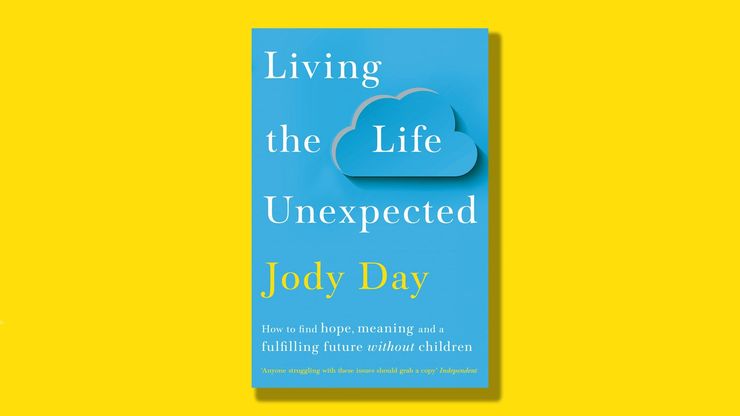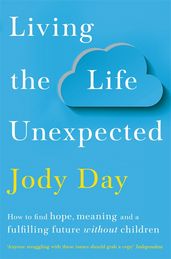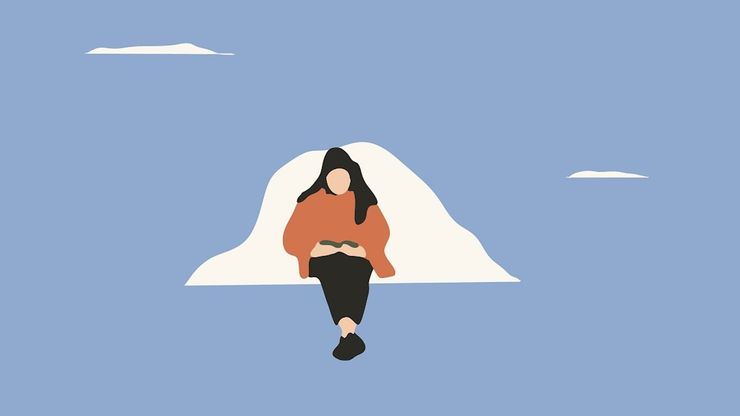How to be happy without children
Jody Day, author of Living the Life Unexpected, on the taboo of childlessness.

Millions of women around the world are child-free by choice, many others are childless by circumstance and are struggling in a life they didn't foresee. Most people think that women without children either 'couldn't' or 'didn't want to' be mothers. The truth is much more complex. Jody Day, author of Living the Life Unexpected, addresses the taboo of childlessness.
You wouldn't think that one in five women are turning forty-five without having had children if you only got your information from women's magazines. To stand in front of a rack of glossy magazines is to see that pregnancy and motherhood are currently the most culturally lauded achievements for modern women, and whilst our mother's generation find the wall of ‘baby-bumps' on display perplexing, for those of us women who are childless-not-by-choice it can feel like a wall of shame, further proving how we've ‘failed' as women, and may trigger desperate feelings of grief, envy, loss and alienation.
Although I now understand that women's magazines are magnifying the social anxiety we're experiencing as a society in response to the massive strides women have made towards equality, it used to be a very personal, visceral and painful trigger for me, and I came to view reading women's magazines as a form of self-harm! Because whether you've been physically unable to have children or, as is now increasingly common, because your their life circumstances (including finding a suitable partner) didn't line up in time, being childless right now is to be cast as some kind of freakish, not quite ‘real' woman. And that sucks!
So, with this as our cultural background, how does a childless woman learn to be happy with how life has turned out?
First of all, it feels important to acknowledge that there are women without children who feel fine about this, the ten per cent of childless women who often identify as ‘childfree' and who have chosen this. Having met a number of them, and counting some of them as friends, they absolutely do not fit the ‘child-hating' stereotype they are so often branded with, but what they do all share is a desire to create meaning and fulfilment in their lives in ways other than parenting biological offspring. They have also (mostly) not experienced the grief of the dream of motherhood not coming true.
And herein lie some clues for those of us childless-not-by-choice: we need to grieve and we need to find meaning and fulfilment in ways other than motherhood. It may be a short sentence, but this is not a short journey, especially when motherhood is currently glorified as the way for adult women to experience fulfilment, joy, nurturing, love, comfort, companionship, laughter, intimacy, meaning, playfulness, creativity, community and belonging - I could go on! But this is our culture's current ‘motherhood myth' and it does a great disservice to both mothers and non-mothers, because, as I write in my book:
Having children is not a free pass to a happy life. If we look at the lives of mothers without jealousy and listen to them without prejudice, we know this to be true. They suffer too and sometimes their children are the very source of that suffering.
Motherhood is not the only way to experience happiness, nor does it protect us from the human condition. Life as a nomo (a not-mother) has its own highs and lows too and is neither Sex in the City nor Bridget Jones but a full, complex life, perhaps partnered, perhaps not and not necessarily the ‘second best' option that mainstream media pumps out. Our own mothers could not have known that encouraging us to spread our wings would lead to so many of us being childless; we've done nothing wrong and we are nothing wrong. It's time to throw off the shame, work through our grief and claim our happy ending, our way. And that's an ending that will be different for each of us.
Jody's tips for finding happiness as a childless woman
1. Be mindful of what media you consume: mainstream women's magazines, websites, TV programmes and novels mostly reinforce the current status quo which is that motherhood is every woman's destiny and that if it doesn't happen you're some kind of weirdo! (Have you noticed that ‘evil' characters are usually childless?!) There are some great websites for nomos now compared to when I started Gateway Women – check out the resources at the back of my book and here: www.gateway-women.com/resources
2. Find and explore the lives of nomo role models. I've been curating a gallery of childless and childfree role models on Pinterest for a few years and it now includes 500+ women with photos and mini-biographies and (where possible) their thoughts on not being mothers. Discovering that many women inspiring women have gone before you and walk alongside you can be a great help. bit.ly/gw-rolemodels
3. Acknowledge that letting go of the dream of motherhood is hard, culturally misunderstood (including by family and friends) and requires you to go through a grieving process. We cannot grieve alone, in our heads – grief is a social emotion - so seek out the support of a therapist experienced in childlessness, and/or work through my book with the support of other nomos that you can meet through Gateway Women, both online and in real life. Chapter 4 in my book Living the Life Unexpected takes an in-depth look at grieving childlessness, including grieving as a single woman and as part of a couple.
4. Get yourself some new nomo friends to plug the gaps in your peer group! Being misunderstood and/or neglected by our ‘old' friends can be a very difficult part of the childless experience, and it's not as personal as it feels. However, once you have a new group of nomo friends you may then find that it's easier to be around your friends with kids again as you're being ‘understood' elsewhere. You can meet your new tribe through the Gateway Women online community or by attending or starting a Gateway Women Meetup (currently in UK, Ireland, Europe, USA, Canada, Australia, New Zealand & South Africa). www.gateway-women.com
5. Accept that your Plan B may not be ‘one big thing' but could be lots of small things that feel nurturing and meaningful to you. It takes time to feel your way there, and it's hard to do it alone. You'll need your nomo sisters to support and inspire you.
Living the Life Unexpected
by Jody Day
Jody Day would have liked to have had children, but it didn't work out that way. At the age of forty-four, she realized that her quest to be a mother was at an end. She presumed that she was through the toughest part, but over the next couple of years, she was hit by waves of grief, despair and isolation. Eventually, she found her way and created the Gateway Women Network, helping many thousands of women worldwide.
In Living the Life Unexpected, Jody Day addresses the taboo of childlessness and provides a powerful, practical 12-week guide to help women come to terms with their grief and to move on to live creative, happy, meaningful, and fulfilling lives without children.



